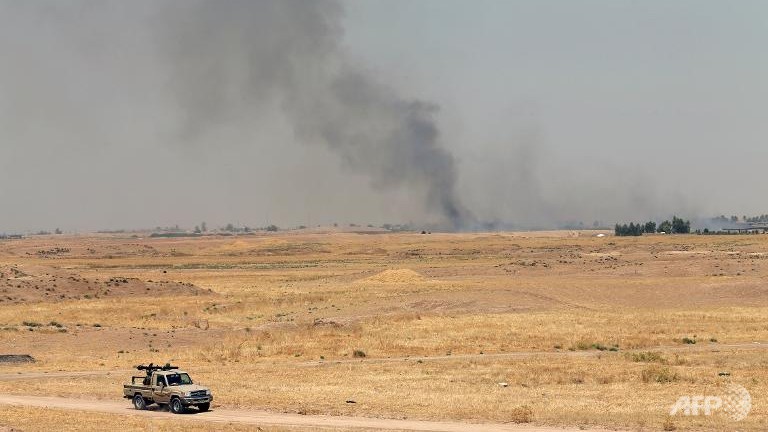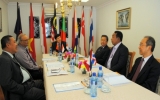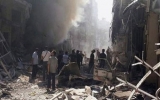Iraq presses counter-offensive, ISIL declares "caliphate"
Update: 30-06-2014 | 00:00:00
Iraqi forces pressed a counter-attack on Saddam Hussein's hometown Tikrit on Sunday as jihadists who led a sweeping Sunni militant offensive that captured swathes of territory declared a "caliphate".
Baghdad took delivery of Russian warplanes to aid it in a crisis said to rival the brutal sectarian war of 2006-2007, with more than 1,000 killed and hundreds of thousands displaced within weeks.
 A vehicle drives as smoke billows from an area controlled by jihadist militants from the Islamic State of Iraq and the Levant (ISIL) following clashes with Shiite Turkmen in the Iraqi village of Bashir. (AFP/Karim Sahib)
Alarmed world leaders have urged a speeding up of government formation following April elections, warning the conflict cannot be resolved by force alone.
And while beleaguered Prime Minister Nuri al-Maliki has conceded a political solution is necessary, his office has for days touted the Tikrit operation, which could be crucial tactically, and for morale in the security forces.
"The security forces are advancing from different areas" around Tikrit, said Lieutenant General Qassem Atta. "There are ongoing clashes."
Atta said troops had detonated bombs planted along routes into the city, which militants took more than two weeks ago.
Witnesses reported waves of government air strikes in central Tikrit and Saddam's palace compound in the city.
The Iraqi forces, according to Atta, are coordinating with recently-arrived US military advisers in "studying important targets".
Maliki's national reconciliation adviser, Amr Khuzaie, said the crisis was even more dangerous than the brutal Sunni-Shiite violence that left tens of thousands dead.
"Now, the danger is definitely more... than 2006, 2007," he told AFP.
Before, militant groups sparked a "sectarian war, but now (the) war is more organised" and the militants' abilities were greater.
On Sunday, ISIL took things a step further, declaring a "caliphate" -- an Islamic form of government last seen under the Ottoman Empire -- extending from Aleppo in northern Syria to Diyala in Iraq.
In an audio recording distributed online, ISIL rebranded itself the Islamic State and declared its chief Abu Bakr al-Baghdadi "the caliph" and "leader for Muslims everywhere".
Though the move may not have a significant impact on the ground, it is an indicator of the group's confidence.
ISIL led an onslaught this month that overran parts of five Iraqi provinces after capturing the Syrian province of Deir Ezzor near Iraq, Raqa in the north, and parts of Aleppo province.
Baghdadi, who once spent time in an American military prison in Iraq, is touted within ISIL as a battlefield tactician, and is increasingly seen as even more powerful than Al-Qaeda leader Ayman al-Zawahiri.
ISIL's announcement came as Iraq took delivery of the first batch of warplanes from Russia, with the newly-purchased Su-25s expected to be pressed into service soon.
An Iraqi official said pilots from Saddam's air force would fly the planes.
Su-25s are designed for ground attack, meaning they would be useful for Iraqi forces trying to root out ISIL-led militants from a string of towns and cities they have seized.
Washington, which has pushed for political reconciliation in the face of what Secretary of State John Kerry has described as an "existential" threat, has sent military advisers to help Iraqi commanders.
The US has stopped short of calling for Maliki to quit but has left little doubt it feels he has squandered the opportunity to rebuild Iraq since American troops withdrew in late 2011.
American officials have also said a proposed $500-million plan to arm and train moderate rebels in neighbouring Syria could also help Iraq fight ISIL, which operates in both countries.
Maliki's security spokesman has said hundreds of soldiers have been killed since the insurgent offensive was launched on June 9, while the UN puts the overall death toll at over 1,000, mostly civilians.
International organisations have urged the establishment of humanitarian corridors to provide aid amid the fighting, with 1.2 million people having been displaced by unrest this year in Iraq.
World leaders have insisted on a political settlement among Iraq's various communities and Grand Ayatollah Ali al-Sistani, revered among the country's Shiite majority, has urged political leaders to quickly form a government after parliament convenes on Tuesday.
Maliki has acknowledged political measures are necessary, but politicians have nevertheless cautioned that naming a new cabinet could still take a month or more.
Despite unity calls, Iraqi Kurdish leader Massud Barzani has said Baghdad could no longer object to Kurdish self-rule in Kirkuk and other areas from which federal forces withdrew as the insurgents advanced.
Kurdish forces moved into areas vacated by Iraqi federal soldiers, putting them in control of disputed areas that they have long wanted to incorporate into their three-province autonomous region, a move Baghdad strongly opposes.
- AFP/ec
A vehicle drives as smoke billows from an area controlled by jihadist militants from the Islamic State of Iraq and the Levant (ISIL) following clashes with Shiite Turkmen in the Iraqi village of Bashir. (AFP/Karim Sahib)
Alarmed world leaders have urged a speeding up of government formation following April elections, warning the conflict cannot be resolved by force alone.
And while beleaguered Prime Minister Nuri al-Maliki has conceded a political solution is necessary, his office has for days touted the Tikrit operation, which could be crucial tactically, and for morale in the security forces.
"The security forces are advancing from different areas" around Tikrit, said Lieutenant General Qassem Atta. "There are ongoing clashes."
Atta said troops had detonated bombs planted along routes into the city, which militants took more than two weeks ago.
Witnesses reported waves of government air strikes in central Tikrit and Saddam's palace compound in the city.
The Iraqi forces, according to Atta, are coordinating with recently-arrived US military advisers in "studying important targets".
Maliki's national reconciliation adviser, Amr Khuzaie, said the crisis was even more dangerous than the brutal Sunni-Shiite violence that left tens of thousands dead.
"Now, the danger is definitely more... than 2006, 2007," he told AFP.
Before, militant groups sparked a "sectarian war, but now (the) war is more organised" and the militants' abilities were greater.
On Sunday, ISIL took things a step further, declaring a "caliphate" -- an Islamic form of government last seen under the Ottoman Empire -- extending from Aleppo in northern Syria to Diyala in Iraq.
In an audio recording distributed online, ISIL rebranded itself the Islamic State and declared its chief Abu Bakr al-Baghdadi "the caliph" and "leader for Muslims everywhere".
Though the move may not have a significant impact on the ground, it is an indicator of the group's confidence.
ISIL led an onslaught this month that overran parts of five Iraqi provinces after capturing the Syrian province of Deir Ezzor near Iraq, Raqa in the north, and parts of Aleppo province.
Baghdadi, who once spent time in an American military prison in Iraq, is touted within ISIL as a battlefield tactician, and is increasingly seen as even more powerful than Al-Qaeda leader Ayman al-Zawahiri.
ISIL's announcement came as Iraq took delivery of the first batch of warplanes from Russia, with the newly-purchased Su-25s expected to be pressed into service soon.
An Iraqi official said pilots from Saddam's air force would fly the planes.
Su-25s are designed for ground attack, meaning they would be useful for Iraqi forces trying to root out ISIL-led militants from a string of towns and cities they have seized.
Washington, which has pushed for political reconciliation in the face of what Secretary of State John Kerry has described as an "existential" threat, has sent military advisers to help Iraqi commanders.
The US has stopped short of calling for Maliki to quit but has left little doubt it feels he has squandered the opportunity to rebuild Iraq since American troops withdrew in late 2011.
American officials have also said a proposed $500-million plan to arm and train moderate rebels in neighbouring Syria could also help Iraq fight ISIL, which operates in both countries.
Maliki's security spokesman has said hundreds of soldiers have been killed since the insurgent offensive was launched on June 9, while the UN puts the overall death toll at over 1,000, mostly civilians.
International organisations have urged the establishment of humanitarian corridors to provide aid amid the fighting, with 1.2 million people having been displaced by unrest this year in Iraq.
World leaders have insisted on a political settlement among Iraq's various communities and Grand Ayatollah Ali al-Sistani, revered among the country's Shiite majority, has urged political leaders to quickly form a government after parliament convenes on Tuesday.
Maliki has acknowledged political measures are necessary, but politicians have nevertheless cautioned that naming a new cabinet could still take a month or more.
Despite unity calls, Iraqi Kurdish leader Massud Barzani has said Baghdad could no longer object to Kurdish self-rule in Kirkuk and other areas from which federal forces withdrew as the insurgents advanced.
Kurdish forces moved into areas vacated by Iraqi federal soldiers, putting them in control of disputed areas that they have long wanted to incorporate into their three-province autonomous region, a move Baghdad strongly opposes.
- AFP/ec
 A vehicle drives as smoke billows from an area controlled by jihadist militants from the Islamic State of Iraq and the Levant (ISIL) following clashes with Shiite Turkmen in the Iraqi village of Bashir. (AFP/Karim Sahib)
Alarmed world leaders have urged a speeding up of government formation following April elections, warning the conflict cannot be resolved by force alone.
And while beleaguered Prime Minister Nuri al-Maliki has conceded a political solution is necessary, his office has for days touted the Tikrit operation, which could be crucial tactically, and for morale in the security forces.
"The security forces are advancing from different areas" around Tikrit, said Lieutenant General Qassem Atta. "There are ongoing clashes."
Atta said troops had detonated bombs planted along routes into the city, which militants took more than two weeks ago.
Witnesses reported waves of government air strikes in central Tikrit and Saddam's palace compound in the city.
The Iraqi forces, according to Atta, are coordinating with recently-arrived US military advisers in "studying important targets".
Maliki's national reconciliation adviser, Amr Khuzaie, said the crisis was even more dangerous than the brutal Sunni-Shiite violence that left tens of thousands dead.
"Now, the danger is definitely more... than 2006, 2007," he told AFP.
Before, militant groups sparked a "sectarian war, but now (the) war is more organised" and the militants' abilities were greater.
On Sunday, ISIL took things a step further, declaring a "caliphate" -- an Islamic form of government last seen under the Ottoman Empire -- extending from Aleppo in northern Syria to Diyala in Iraq.
In an audio recording distributed online, ISIL rebranded itself the Islamic State and declared its chief Abu Bakr al-Baghdadi "the caliph" and "leader for Muslims everywhere".
Though the move may not have a significant impact on the ground, it is an indicator of the group's confidence.
ISIL led an onslaught this month that overran parts of five Iraqi provinces after capturing the Syrian province of Deir Ezzor near Iraq, Raqa in the north, and parts of Aleppo province.
Baghdadi, who once spent time in an American military prison in Iraq, is touted within ISIL as a battlefield tactician, and is increasingly seen as even more powerful than Al-Qaeda leader Ayman al-Zawahiri.
ISIL's announcement came as Iraq took delivery of the first batch of warplanes from Russia, with the newly-purchased Su-25s expected to be pressed into service soon.
An Iraqi official said pilots from Saddam's air force would fly the planes.
Su-25s are designed for ground attack, meaning they would be useful for Iraqi forces trying to root out ISIL-led militants from a string of towns and cities they have seized.
Washington, which has pushed for political reconciliation in the face of what Secretary of State John Kerry has described as an "existential" threat, has sent military advisers to help Iraqi commanders.
The US has stopped short of calling for Maliki to quit but has left little doubt it feels he has squandered the opportunity to rebuild Iraq since American troops withdrew in late 2011.
American officials have also said a proposed $500-million plan to arm and train moderate rebels in neighbouring Syria could also help Iraq fight ISIL, which operates in both countries.
Maliki's security spokesman has said hundreds of soldiers have been killed since the insurgent offensive was launched on June 9, while the UN puts the overall death toll at over 1,000, mostly civilians.
International organisations have urged the establishment of humanitarian corridors to provide aid amid the fighting, with 1.2 million people having been displaced by unrest this year in Iraq.
World leaders have insisted on a political settlement among Iraq's various communities and Grand Ayatollah Ali al-Sistani, revered among the country's Shiite majority, has urged political leaders to quickly form a government after parliament convenes on Tuesday.
Maliki has acknowledged political measures are necessary, but politicians have nevertheless cautioned that naming a new cabinet could still take a month or more.
Despite unity calls, Iraqi Kurdish leader Massud Barzani has said Baghdad could no longer object to Kurdish self-rule in Kirkuk and other areas from which federal forces withdrew as the insurgents advanced.
Kurdish forces moved into areas vacated by Iraqi federal soldiers, putting them in control of disputed areas that they have long wanted to incorporate into their three-province autonomous region, a move Baghdad strongly opposes.
- AFP/ec
A vehicle drives as smoke billows from an area controlled by jihadist militants from the Islamic State of Iraq and the Levant (ISIL) following clashes with Shiite Turkmen in the Iraqi village of Bashir. (AFP/Karim Sahib)
Alarmed world leaders have urged a speeding up of government formation following April elections, warning the conflict cannot be resolved by force alone.
And while beleaguered Prime Minister Nuri al-Maliki has conceded a political solution is necessary, his office has for days touted the Tikrit operation, which could be crucial tactically, and for morale in the security forces.
"The security forces are advancing from different areas" around Tikrit, said Lieutenant General Qassem Atta. "There are ongoing clashes."
Atta said troops had detonated bombs planted along routes into the city, which militants took more than two weeks ago.
Witnesses reported waves of government air strikes in central Tikrit and Saddam's palace compound in the city.
The Iraqi forces, according to Atta, are coordinating with recently-arrived US military advisers in "studying important targets".
Maliki's national reconciliation adviser, Amr Khuzaie, said the crisis was even more dangerous than the brutal Sunni-Shiite violence that left tens of thousands dead.
"Now, the danger is definitely more... than 2006, 2007," he told AFP.
Before, militant groups sparked a "sectarian war, but now (the) war is more organised" and the militants' abilities were greater.
On Sunday, ISIL took things a step further, declaring a "caliphate" -- an Islamic form of government last seen under the Ottoman Empire -- extending from Aleppo in northern Syria to Diyala in Iraq.
In an audio recording distributed online, ISIL rebranded itself the Islamic State and declared its chief Abu Bakr al-Baghdadi "the caliph" and "leader for Muslims everywhere".
Though the move may not have a significant impact on the ground, it is an indicator of the group's confidence.
ISIL led an onslaught this month that overran parts of five Iraqi provinces after capturing the Syrian province of Deir Ezzor near Iraq, Raqa in the north, and parts of Aleppo province.
Baghdadi, who once spent time in an American military prison in Iraq, is touted within ISIL as a battlefield tactician, and is increasingly seen as even more powerful than Al-Qaeda leader Ayman al-Zawahiri.
ISIL's announcement came as Iraq took delivery of the first batch of warplanes from Russia, with the newly-purchased Su-25s expected to be pressed into service soon.
An Iraqi official said pilots from Saddam's air force would fly the planes.
Su-25s are designed for ground attack, meaning they would be useful for Iraqi forces trying to root out ISIL-led militants from a string of towns and cities they have seized.
Washington, which has pushed for political reconciliation in the face of what Secretary of State John Kerry has described as an "existential" threat, has sent military advisers to help Iraqi commanders.
The US has stopped short of calling for Maliki to quit but has left little doubt it feels he has squandered the opportunity to rebuild Iraq since American troops withdrew in late 2011.
American officials have also said a proposed $500-million plan to arm and train moderate rebels in neighbouring Syria could also help Iraq fight ISIL, which operates in both countries.
Maliki's security spokesman has said hundreds of soldiers have been killed since the insurgent offensive was launched on June 9, while the UN puts the overall death toll at over 1,000, mostly civilians.
International organisations have urged the establishment of humanitarian corridors to provide aid amid the fighting, with 1.2 million people having been displaced by unrest this year in Iraq.
World leaders have insisted on a political settlement among Iraq's various communities and Grand Ayatollah Ali al-Sistani, revered among the country's Shiite majority, has urged political leaders to quickly form a government after parliament convenes on Tuesday.
Maliki has acknowledged political measures are necessary, but politicians have nevertheless cautioned that naming a new cabinet could still take a month or more.
Despite unity calls, Iraqi Kurdish leader Massud Barzani has said Baghdad could no longer object to Kurdish self-rule in Kirkuk and other areas from which federal forces withdrew as the insurgents advanced.
Kurdish forces moved into areas vacated by Iraqi federal soldiers, putting them in control of disputed areas that they have long wanted to incorporate into their three-province autonomous region, a move Baghdad strongly opposes.
- AFP/ec
 Seminar seeks ways to boost ASEAN - Latin America connectivity
Seminar seeks ways to boost ASEAN - Latin America connectivity
 Indonesia seeks India's help in health education
Indonesia seeks India's help in health education
 Indonesia named world's most generous country in 2024
Indonesia named world's most generous country in 2024
 Philippines: Over-4m-high floodwaters make thousands of houses submerged
Philippines: Over-4m-high floodwaters make thousands of houses submerged
 Singapore’s public sector records carbon reduction in 2023
Singapore’s public sector records carbon reduction in 2023
 Pressure facing the EU on its growth track
Pressure facing the EU on its growth track
 Efforts boosted to combat transnational organised crime
Efforts boosted to combat transnational organised crime
 Nearly 200 terror suspects arrested in Indonesia in two years
Nearly 200 terror suspects arrested in Indonesia in two years
 Vietravel launches tourism joint venture in India
Vietravel launches tourism joint venture in India
 Vietnam willing to enhance int'l cooperation in transnational crime combat
Vietnam willing to enhance int'l cooperation in transnational crime combat



